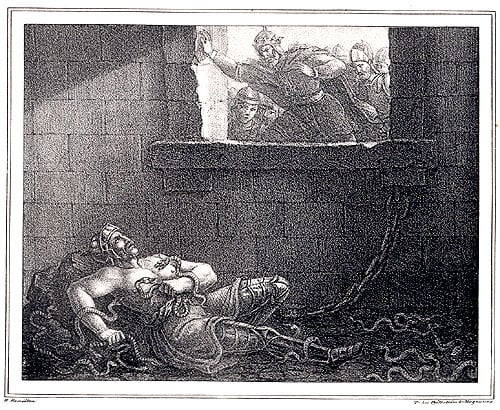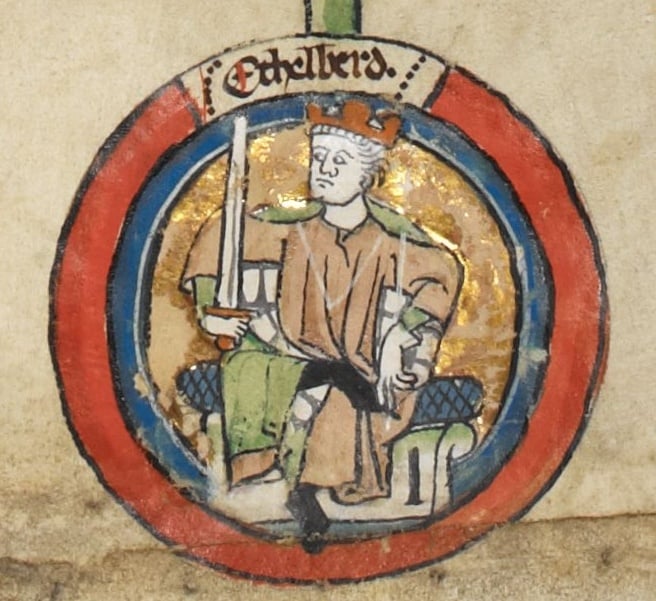Podcast: Play in new window | Download
On 864 or 865, a great Scandinavian fleet of Dragon ships, or Drakkars, beached themselves at Thanet in Kent.
For the people of the south, this would have been terrifying It had been scarcely more than a decade since the last fleet of Drakkars landed in Thanet, and the army exploded forth from those ships went on to raid Canterbury, London, and may have taken Winchester had they not been stopped by King AEthelwulf and AEthelbald.
And here they were again… but now King AEthelwulf was dead, as was his son, AEthelbald… all of the South was in threat. Where would the Vikings go this time? Would they strike Canterbury again? Loot the treasure chest of the south, London? Unless something was done, everyone was vulnerable.
The nobility, likely under King AEthelberht’s leadership, tried to head off the disasterand sent emissaries to the Vikingr army. These emissaries promised vast sums of money in exchange for peace. This tribute would become known as the Danegeld… the Dane Payment.
[s2If !current_user_can(access_s2member_level1)]
Click here to be able to read the full rough transcript.
[/s2If]
[s2If current_user_can(access_s2member_level1)]
It was exactly what it sounds like. A bribe for peace. The hope being that, if they could just give the opportunistic raiders what they were after, material wealth, then they might stay in their camp…why risk your life if you can get paid for sitting on the beach?
But there were two problems with the Danegeld. The first problem was one of simple economics.
The south was no stranger to troubles, they had suffered numerous raids over the years, sometimes winning, sometimes losing. But even victorious battles have a cost and these raids were straining the Southern economy.
In fact, shortly after the last great fleet landed in Thanet in 851, coin production halted entirely … and then suddenly AEthelstan, the crown prince and previous ruler of Kent, vanished.
We don’t know what exactly happened, but the interruption and sudden disappearance of the crown prince is suspect. While the Chronicler’s are quick to laud the royal family’s military success at places like Aclea (which was described as the greatest slaughter of a heathen army ever seen) and the naval successes in battles like Sandwich, this sudden quiet in the record suggest there were significant troubles underlying the story… and Wessex (and it’s subkingdom of Kent) was getting stretched thin. Wessex may have been outmatched by their Scandinavian enemies.
We see evidence of a weakening kingdom through distribution of coins in the south.
In the last 18 months of King AEthelwulf’s reign (if you’ll remember he was the King who had defeated the prior great fleet, and was also Alfred the Great’s father)… Well, suddenly West Saxon coinage began to be revived under his rule… and that increased production continued. By the time we reach the 860s, when this second great fleet landed, coin minting had expanded even farther.
At the same time, we see Wessex’s northern neighbor, Mercia, go through a similar expansion of money production. Mercia at this point was being ruled by King Burgred and Queen AEthelswith (Alfred’s sister).
So the take away here is that, shortly before this great fleet arrived, we’ve seen the two major kingdoms of the south, linked by marriage, expand their production of coins. Noticeably.
Why?
The answer is complex. It would be easy to think the wealth of the upper classes in the South was simply growing… and there’s good reason to wonder. While these raids were a catastrophic event for any locals who were caught up in them… the upper classes were quick to find ways to exploit the situation to expand their own wealth and standing. Lands were being acquired, wealth was being consolidated. It’s the same old story, you’ll always find unscrupulous people who are looking to turn a national crisis into a personal advantage. Even if it’s just in the short term.
This explosion of coin production could be a reflection of that. Especially since the coins would both enhance the personal wealth of the monarch striking them since he would keep a cut of the precious metals, and also further his prestige, because these coins would bear his name.
But if you look closely at these coins, you realize they’re telling a different story. While there were more coins being struck, the coins themselves were increasingly debased. Meaning that cheap metals were being mixed into the precious metals that the coins drew their value from. That suggests that the economy might have been in a great deal of trouble. The production of such a large number of coins may have been an indication that the south was dealing with rapid inflation.
And Vikingrs were many things… opportunistic, ruthless, violent… but they were rarely naive. These people were professional raiders at this point. They did this full time, and they had a great deal of success at it. They were also worldly, and often conducted a side business of trading (after all, what else are you going to do with all that loot?) Do you really think that they would be unable to recognize a cheap, debased, practically counterfeit, coin?
[Pink Floyd Money?]
That’s problem number one with the Kentish grand plan of a Danegeld. How effective is a bribe if the silver coins you’re delivering are mostly tin?
The second problem was that they were Vikings. This wasn’t a clash of Kingdoms. The primary qualifier for leadership among a Vikingr crew was your ability to bring success and treasure to your followers. There wasn’t a unified leadership, there wasn’t even a unified culture… these ships were often multi-cultural and crewed by people from all over the known world. And the were brought together by one critical quality they all had in common: the desire for wealth, and a flexible sense of morality on how to acquire it.
With that in mind, even if the Captains that the emissaries swore peace with were good to their word, would that really matter for the other Captains? Hell, would those promises even matter to their crews?
Think about it… if you were a captain, you took payment, and you told your crew that there wouldn’t be any raids this year… what would stop your crew from joining another captain who didn’t make that same pledge? Would would stop them from overthrowing you for failing to deliver on your only duty… to bring them wealth /and/ glory.
You had one job, Cnut.
This problem was likely exacerbated by the fact that the emissaries almost certainly demanded that the promise be consecrated with some sort of Christian ceremony or a swearing upon a Christian object. And the Scandinavians had shown that they not only understood Christian superstitions, but they were quick to exploit them, as the people of Luna had discovered only a few years earlier with that low-rent Trojan horse we talked about in episode 194. If Bjorn Ironsides, son of Lodbrok, was comfortable breaking oaths with these strange southern men… why shouldn’t they? Especially when so much money could be made.
So the Captains took the payment and swore peace. And the emissaries rode away, confident in their diplomatic successes.
Then, as soon as they were out of sight, plans were drawn up for that year’s raids.
They had an ideal staging location. Thanet would be difficult for any Anglo Saxon forces to take. The Vikingrs also knew that most of the people who occupied this fertile and wealthy land were farmers. Only a very few were warriors.
Granted, those warriors dangerous to the extreme. Like the northmen, the Anglo Saxon warriors devoted their entire lives (starting at the age of 8) to war. They were armed to the teeth, they were armored, they were born and bred to kill and would fight to the death for their lord… even if he had already fallen in battle.
Woe to any raiding band that underestimated those strange men clad in gold and garnet cloisonne… They were practically Northmen themselves.
But the Vikings also knew that these warbands… those that travelled in the Werod… were few in number. If the Viking bands could conduct their raids quickly, or if they could muster numbers large enough to overwhelm them, they could move throughout the south without much danger.
They knew that, from Thanet, they could reach any number of wealthy monasteries and cities in the South. Canterbury, Rochester, London, even Winchester… the possibilities were endless.
Everywhere in the south east was in threat… no one was safe… and as night fell, the Vikingr army marched. The Chronicle doesn’t give us a specific list of towns that they struck, but we are told under the cover of darkness they “overran all of Kent eastward.”
Where was King AEthelberht when this happened? The Chronicle is silent regarding his involvement. In fact, the Chronicle says nothing about specific targets, what sort of resistance was offered, nor of any type of tactic.
Instead, this event is discussed like it was a natural disaster. There were raids… and that was it.
As you know, these accounts are at least partially royal propaganda supporting the House of Wessex, and the scribes often give us the impression that family of Alfred the Great were essentially medieval super heroes specially designed to fight Vikings.
We’re lead to believe that they just rarely lost.
If we trust our sources.
Which we don’t.
Scholars almost universally agree there were more raids than what was recorded, and the vast majority of scholars also agree that what we’re being told in the Chronicle and in Asser’s writings whitewashes most of the West Saxon losses, underplays other kingdoms, and generally just focuses on moments where the House of Wessex were out there kicking ass and taking names.
Given that, let’s chat about where King AEthelberht might have been. He had been reigning in Kent for years before he had inherited the throne Wessex, so it’s reasonable to assume that he continued to spend a great deal of time in Kent and that his Court was largely based there. Further, given the Scandinavian invasion of Thanet, and the organization of the Danegeld, it’s likely that he would have arrived in Kent to personally oversee those arrangements. And the seat of Power of Kent was Canterbury… which also happened to be one of the richest targets in the south for plunder.
Canterbury had numerous churches, which the Vikings would have probably seen as poorly guarded banks, it was an urban trade center, and it even had it’s own mint. This settlement was wealthy… if you were a Vikingr and could make only one raid in Kent, Canterbury would probably be it.
The only real downside of striking Canterbury would have been its defenses. Being that it was such an obvious target, their defenses would have been bolstered, and the old walls constructed by the Romans were still there… and they were maintained. In fact, while the Romans had numerous gates leading into the city, the Anglo Saxons started constructing churches and other buildings directly over those weakspots on the walls to better defend against any potential raiders.
There were only a handful of entry points into the old Civitas, unless you scaled the walls.
This is where the odd detail that the Chronicle gives us starts to become more interesting… it tells us that they ravaged the East of Kent in the night.
Now, if you want to plunder a little undefended village, you don’t need to worry about the hour… and if you’re plundering a /lot/ of settlements, it’s going to take far more than one evening. No matter how much redbull you drink, you just can’t cram that hard.
But if they had their sights set on a single, large target… well, that might be able to be done in a single night. And given the defenses of Canterbury, the safest way to attack that town would probably be at night… after their guard was dropped because they thought they had bought peace.
So is it possible that Canterbury was the target? I think it is, based on the few bits of evidence we are given. And if King AEthelberht was in the area, as he almost certainly was, then we have every reason to assume he would have been in Canterbury. It was his seat of power, after all.
And then the Vikings attacked. I would imagine that, much like in the accounts of other night raids, the army of Northmen would have acted swiftly with practiced efficiency. But even if they were using the shadows to cut down any watchmen before they could cry for help, eventually someone would spot them… someone would sound the alarm. And then all hell would have broken loose.
In a circumstance like that, King AEthelberht would have been out there, organizing his heorthwerod (his personal warband) and any other werod’s that came to his aid. War in this time was personal and a King was often directly involved in battle.
A King was a warleader. Especially a King of Wessex. He was a son of AEthelwulf, a grandson of Egbert. His father and older brothers had fought and defeated massive Vikingr armies in the past, and now that responsibility would have fallen upon him.
But curiously, the sources remain absolutely silent on any details, other than to mention that the raiders were successful.
Though, they do give away the game in what comes next. We are told that, shortly after the south east was plundered in the night, King AEthelberht’s younger brother… AEthelred, took the throne of Wessex and Kent.
They don’t tell us that AEthelberht died, though if they did they might have had to mention the circumstances of his death, and the scribes were often loath to mention any direct failures by Alfred’s family. Instead, King AEthelberht just vanishes, never to be seen again.
Now, is it possible that he wasn’t involved in battle at all? Sure. In fact, it’s possible that he might have died from heart disease, rather than from Olaf the Hairy. It’s even possible that he didn’t die at all, and was simply deposed by his own nobles who may have been justifiably angry that the Danegeld had failed so spectacularly and they basically lost twice as much money as they would have otherwise.
These are all possibilities. But it is curious timing.
And now, in the space of just over a decade, we have seen King AEthelwulf and three of his sons (all Kings themselves) die in rapid succession. And with every death, the Vikings just happen to be in the area.
It’s not proof… we don’t have DNA evidence… we haven’t found the murder weapon… I’m not saying that it was definitely the Vikings who killed them.
What I’m saying is that it’s pretty suspect that the glove fits and, when we went to question them, they took off in their white Ford Bronco.
It seems that the Great Heathen Army had taken their first victim. It wouldn’t be their last.
More ships were arriving, bolstering their numbers. And the presence of these northmen was an enormous problem for the Anglo Saxons, and one that was not helped by the fact that the new King of Wessex was a fourth born son, was undoubtably traumatized by the losses of his father, his mother, and his three older brothers… and who was likely overwhelmed by the responsibilities that had landed on his shoulders… and the pressure that his younger brother was placing upon him to share rule. Alfred wanted a chance to have a say in what came next for Wessex. After years of watching his father and brothers wage war against the Viking invasions – he may have wanted a shot at proving his own greatness. And the law said that he had the right.
AEthelred would have to be very careful in how he navigated this.
And we’ll talk about that next week.
But before we end this show, I have one last thing I’d like to share with you…
[/s2If]
Support the Show










